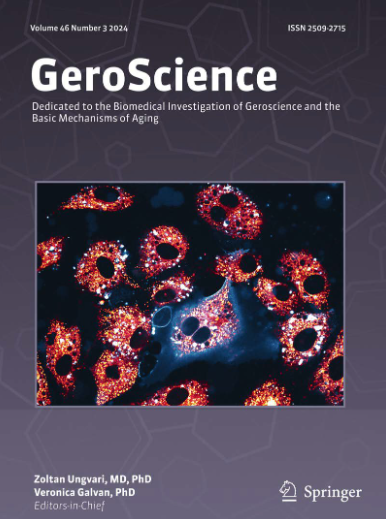表儿茶素、halofuginone和mitoglitazone对雄性而非雌性遗传异质性小鼠的寿命延长作用。
IF 5.4
2区 医学
Q1 GERIATRICS & GERONTOLOGY
引用次数: 0
摘要
通过干预测试计划(ITP)对2021年繁殖的小鼠进行了2BA (2BA),二氯乙酸(DCA),表儿茶素(EPI),福斯克林(FSK), Halofuginone (HAL)和Mitoglitazone (MIT)可能的寿命益处测试。从7月龄开始,所有药物在饮食中自由施用。在雄性小鼠中,EPI使中位寿命延长了约5%,HAL和MIT分别使中位寿命延长了约9%。EPI和HAL,而不是MIT,提高了90%的存活率。除了在ITP确定的延长寿命的干预措施清单上增加3种新的药物外,该报告还继续了迄今为止确定的延长寿命药物疗效方面的强烈男性偏见。本文章由计算机程序翻译,如有差异,请以英文原文为准。
Extension of lifespan by epicatechin, halofuginone and mitoglitazone in male but not female genetically heterogeneous mice.
Mice bred in 2021 were tested by the Interventions Testing Program (ITP) for possible lifespan benefits of 2BAct (2BA), dichloroacetate (DCA), Epicatechin (EPI), Forskolin (FSK), Halofuginone (HAL) and Mitoglitazone (MIT). All agents were administered in the diet ad libitum beginning at 7 months of age. In male mice, EPI increased median lifespan by ~ 5%, and HAL and MIT each increased median lifespan by ~ 9%. EPI and HAL, but not MIT, increased 90% survival. In addition to adding 3 new agents to the list of interventions identified by the ITP that extend lifespan, this report continues the strong male bias in the efficacy of life-extending drugs identified so far.
求助全文
通过发布文献求助,成功后即可免费获取论文全文。
去求助
来源期刊

GeroScience
Medicine-Complementary and Alternative Medicine
CiteScore
10.50
自引率
5.40%
发文量
182
期刊介绍:
GeroScience is a bi-monthly, international, peer-reviewed journal that publishes articles related to research in the biology of aging and research on biomedical applications that impact aging. The scope of articles to be considered include evolutionary biology, biophysics, genetics, genomics, proteomics, molecular biology, cell biology, biochemistry, endocrinology, immunology, physiology, pharmacology, neuroscience, and psychology.
 求助内容:
求助内容: 应助结果提醒方式:
应助结果提醒方式:


